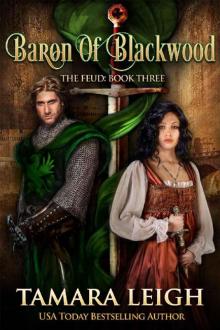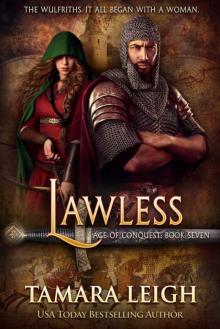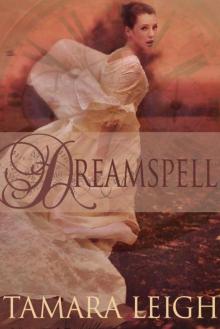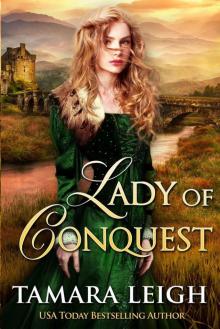- Home
- Tamara Leigh
BOUNDLESS: A Medieval Romance (AGE OF CONQUEST Book 6) Page 2
BOUNDLESS: A Medieval Romance (AGE OF CONQUEST Book 6) Read online
Page 2
Then she ran.
They were the shepherd to her sheep—ever turning her from Scotland. If they could corner her, they would become the wolf to her sheep.
There being no means of securing a horse without drawing the attention of one who defended that border demesne, the only homeward progress Marguerite had made was during the first hour, and it was too little. On foot, skirts knotted up to free her legs, she struggled to stay ahead of pursuers who had numbered a dozen at the outset. Had she not turned opposite the direction they knew she would flee, they would have taken her to ground before now.
When they picked up her trail again as she moved south, only four of her grandfather’s men tracked her, the remainder likely continuing their search near the border. Now those who carried torches through the night had surely caught sight of her amid the trees. How else could they draw so near that their Norman-French accents were clear as they shouted words of which she could make no sense above the pound of her heart?
Lord, let me not have come this far only to fall, she prayed and, bending low, traded one cover for another.
She listened to their advance, and when the light of torches bent around the tree against which she pressed herself, hastened to the opposite side and drew from her hose the dagger her sire had insisted she conceal lest the one on her belt was taken.
But of what use against four warriors? fear asked of her.
Faced with defeat, do not make it easy for the enemy to seal their victory, her sire answered from years past when he taught her the swipe and throw of a blade. If no opening can be made nor miracle granted, defend your dignity.
The dignity of the Scots ahead of the venom of these Normans, she told herself.
“She is here!” her uncle shouted. “You—left. You—right. You—watch our backs.” Deftly, he made a noose of his men of which he would be the knot, and this time he might do more than mark her throat.
“Lord help me,” she whispered.
“Show yourself!” he commanded, this time in the language of the Saxons that was near enough that of Lowland Scots she understood perfectly. “My patience wanes, and you will like me even less when I am at my meanest.”
No place to run outside of torchlight, she thrust off the tree. One reach of the legs, two…
Shouts and hooves sounded behind and both sides—and, unexpectedly, ahead. How had four riders become seven? How had these three gotten in front of her?
By eschewing torches, she realized.
There being no opening that could not be closed quickly, she was tempted to go to her knees in supplication that might spare her life, but she heard her sire say, Fight, wee sparrow!
She would have tried had not the three before her spurred past and, in the Saxon language, answered the curses and threats shouted in Norman-French. And did one of those voices belong to a woman?
Marguerite swung around. Seeing Gerald and his men attacked by those lacking torches, she told herself, Here your opening. Here your miracle. Run!
But what the Lord provided was thwarted by the twist of an ankle, and too soon the clash ended. Though she had managed to remain upright and limp opposite, once more riders came for her. Exposed by moonlight penetrating the trees, she turned.
The three slowed, and the giant of a man whose red hair and thick beard were in the Saxon style, said in the words and accent of the conquered, “Peace be with you.”
She shifted her gaze to another sizable man whose stout frame sat lower in the saddle and appearance was also distant from the conquerors. And the warrior far left…
The woman Marguerite had heard, a single braid draping her shoulder.
“I am Vitalis,” said the red-headed warrior as he reined in. “Here, Zedekiah…” He jutted his chin. “…and here, Em. Those miscreants will trouble you no more.”
Her uncle and his men were dead?
“Three felled, and the fourth who fled was injured severely enough that come the morrow, he may be more dead than alive,” he added.
“Norman swine,” growled Zedekiah.
“What are you called?” Vitalis asked.
Noting blood on his tunic, she closed her mouth. These Saxons—doubtless, rebels—had reason to hate Normans, and a Norman she was on the side of her mother. If she spoke, they might hear the enemy about her before they heard her father’s people. Too, many English disliked the Scots as much as they did Normans.
“Your name?” he repeated.
She considered again the man and woman on either side of him and saw the latter scrutinized the one whose knotted skirts showed her hosed legs. “Be not afeared,” said the one called Em. “We are Saxons the same as you.”
Of course they believed that of her. She had been pursued by Normans, Gerald had called to her in Saxon, and these untamed Northern lands were still of England though Malcolm wished to make them his.
“Tell us your name,” Em prompted.
Marguerite touched the bruised flesh of her throat, moved fingers to her lips, shook her head.
The stout one grunted. “Mayhap a mute.”
“Likely a vow of silence,” Em said.
Vitalis urged his mount forward, and when Marguerite jumped back and stumbled, drew rein. “We cannot know what you have suffered, but as you are injured—thus, greater prey to the invaders—you will have to trust your fellow Saxons. Come.”
She shook her head.
“You may keep your dagger to hand.”
Another shake.
Now Em advanced on her. “You can share my saddle.”
More than Marguerite wanted to refuse, she longed to accept. Others of her grandfather’s men could be en route—perhaps all were it believed she had abandoned the hope of Scotland. Having been on the verge of being captured, she had even less chance of escape now she was injured.
She looked from the woman who appeared a few years younger than she to the men. Lord, do not forsake me as you forsook Cannie and my escort, she silently beseeched, then slid the dagger beneath her belt.
When Em drew alongside, Marguerite fit her uninjured foot in the stirrup and the rebel gripped her arm to aid in swinging her up behind.
Though the ride that followed was rigorous, she was grateful lest fatigue, sorrow, and the pain of a day without end render her senseless and dump her from the saddle.
Upon reaching camp, Marguerite was assured she was among friends, but she did not believe it, most of the Rebels of the Pale regarding her with suspicion as they set cooking fires ahead of the dawn. Not that she thought Em insincere. Simply, the woman believed her one of their own.
Previous to Malcolm granting sanctuary to Edgar the Aetheling, whom Saxons wished to reclaim England’s throne, the King of Scots was disliked by the English for his raids across the border. Though they must think better of him now Edgar and his family were guests at his court, they could not yet know how great the support to be given the young man in asserting his right to the throne.
In a month—two at most—Edgar would bring forces south to join with the Saxon resistance and Danes come across the sea. By the sword, the city of York would be emptied of its three thousand Normans and made the eastern base from which to begin ousting the conquerors. Until then…
Hold your tongue and remain the mute, Marguerite counseled as she exercised restraint in satisfying hunger that made her long to tear at the dried meat with her teeth.
“More ale?” Em asked.
Marguerite looked from the warming fire before which they sat, accepted the cup, and drained it.
Hearing a sharp breath, she saw the woman’s eyes were on her throat. Then just as Em expressed shock over the bruises, Marguerite reacted to eyes only now she noticed were of different colors—one blue, one brown.
“I was born this way,” the woman said and jutted her chin. “You were not born that way.”
Marguerite shook her head.
“Did the Normans…?” Em swallowed loudly. “Ever they take what does not belong to them.”
Realizing it was believed she had been ravished, Marguerite shook her head vigorously.
“Then you are fortunate—or blessed as you would say if you are a holy woman. Are you of the Church?”
Another shake.
“Does a vow of silence—repentance for sin—seal your lips?”
Unable to decide whether it was best to deny or acknowledge that, and embracing the comfort silence would afford while she mourned her dead, Marguerite did not respond.
“It matters not, but we shall need a name. Though I do not read well, I can make sense of bits and pieces. Can you write it?”
Marguerite could write and read in three languages, but—
“There is another way,” Em said as if to save her the embarrassment of being illiterate. “Is your name’s first sound the same as Aelfled?”
Certain there was no harm in this, Marguerite shook her head.
“What of Beatrice?” When that was rejected, Em continued through the letters until a name beginning with M made Marguerite nod. Half a dozen names were submitted that began the same, and when Em landed on Margaret, she was rewarded with a nod. Not only was it the Saxon equivalent of Marguerite’s Norman name, but it was that of the Aetheling’s sister with whom King Malcolm was entranced.
“Margaret is a pretty name, but I expected something softer.”
Was Marguerite softer? She supposed so, its ending more musical and of higher pitch than the one by which these rebels would call her.
“Now we must determine how to return you to your family, Margaret. Your home is here in the North?”
Much farther north, Marguerite thought and shook her head.
“The Midlands?” When that was rejected, Em said, “The South? That was my home until—” Now she shook her head as if her thoughts were unwelcome. “You have family, have you not?”
That hurt. All those of her blood were dead, as well as Cannie not of her blood. As for the Scots who called her their own, she dare not venture there. She shook her head again.
“I am sorry for what those Normans made you suffer. Mayhap Vitalis will allow you to join us. Would you like that?”
Lady Marguerite of the Scots among Saxon rebels? It seemed wrong, but for now it was her only option. She bobbed her chin.
“What skills have you besides giving threat with a dagger?”
She could do more than threaten, though little beyond defense of her person. Better she was known as Marguerite of fine needlework, ink and quill, and knowledge of herbs.
“Have you an interest in learning weapons?” Marguerite’s wide-eyed surprise made her grimace. “Worry not. There are other ways to support the resistance.”
After all that had happened since learning her mother had died, it was tempting to seek instruction in arms, but she was a lady and would not be among these people long.
“You can cook?” Em asked.
Marguerite had aided her mother and Cannie in preparing and serving meals, but not for any of great number. Another shake of the head.
Em considered Marguerite’s fouled gown. “Are you a lady?”
That would be more obvious were she at court, but her traveling garments were simple, albeit of quality material.
When she did not respond, annoyance flitted across Em’s face. “Do you know the healing arts?”
Marguerite nodded.
“A useful skill, and one we will need in great measure if the Aetheling decides to be a man and come out of the North to rally his supporters.”
Em had good cause to question Edgar. Not only was he young but, from Marguerite’s observations, more given to sitting a throne others placed him on than fighting to win it for himself. For that, when his great-uncle, King Edward, died, it was not a Saxon of royal blood who next wore the crown but the powerful, renowned warrior, Earl Harold Godwinson. And even he could not keep hold of England when the Duke of Normandy brought war to these shores.
Oh Malcolm, I fear the aid you give Edgar will be squandered, she thought. Though she suspected her king believed it himself, if he had set his mind on wedding the sister, aiding the brother would seal the bargain.
Em stood. “Whilst you gain your rest, I shall speak with Vitalis.”
There being nothing Marguerite wanted more than to be alone, she nodded.
A short while later, having made her bed distant from the rebels, she huddled beneath her blanket and yielded to grief over the loss of her mother, Cannie, and Malcolm’s men. For hours she wept, and when finally she grew numb, turned her thoughts to Scotland to which she would return once her ankle healed.
“Within a fortnight,” she whispered, “Nay, a sennight.”
She could not know that seven days would become six months, during which the Aetheling-led resistance and his Danish allies took the city of York by slaying thousands of Normans while Marguerite watched from afar.
An extraordinary victory.
An inspiring victory.
A temporary victory.
Within days, the Danes’ betrayal saw the city once more in Norman hands. Then came the harrying of the North, thousands of innocents destroyed by William the Conqueror who ordered the land wasted to ensure those who continued to resist his rule were denied support and resources.
Six long months playing a mute Saxon in England, then Marguerite known as Margaret determined to go home before she tore the heart of a man that did not deserve to be torn twice in a lifetime.
Chapter One
Northumbria, England
Late Winter, 1070
Accursed Edgar!” Marguerite muttered.
His bid for the crown lost when King William’s bribery of the Danes overturned the Aetheling’s victory at York, once more he had crossed from Scotland into England.
Not with Malcolm’s blessing, she was certain, though possibly his indulgence were he aware of the undertaking of the one whose sister was to become Queen of Scots—an indulgence that could devastate innocent Saxons, just as William’s harrying had done, the sight of which her escort had tried to spare her by going wide around fire-ravaged homes, the carcasses of animals, and the bodies of men, women, and children who should have fled sooner.
Now the Norman contingent—King William’s solution to the rebellion—that had not reached this village where Marguerite and her escort paused for the night, approached. And Edgar who had ridden hard down its center with a score and ten men had led them here.
In the midst of panicking villagers, the Aetheling leapt from the saddle. “Take cover! We do battle!”
Having donned her mantle and shoved her feet into slippers removed in preparation for bed, Marguerite pushed past her escort outside the inn. “What have you done, Edgar?” she demanded in a voice coarse from disuse.
The young man who had begun issuing orders to his men came around. “Who are you to—?” His eyes widened and color drained.
She supposed she must seem a ghost. A sennight before the Saxon resistance led by the Aetheling took York, tale had reached the Rebels of the Pale that Scotland’s king had laid waste to a border demesne held by a Norman family. None of the rebels had known the identity of that family nor the reason for the attack, but Marguerite had—and that her king held her grandfather responsible for his missing ward and her escort.
Guilt had gripped her for not trying harder to return home. Not that it would have significantly altered Malcolm’s vengeance, but proof she lived might have spared Claude as she was certain her grandfather was not spared—nor Gerald were he the one who escaped the Saxon rebels who defended her.
If Claude yet lived when they came, she reminded herself as ever she did to assuage guilt.
Still, remorse aplenty for others lost to the blade and fire, especially if among them were servants who had nothing to do with the massacre of Malcolm’s men and Cannie.
“You are supposed to be dead, Lady,” Edgar said in a voice deeper than remembered.
She stepped over ground moistened by light snow that had fallen earlier. As the four warrio
rs tasked with returning her to Malcolm’s court drew alongside, she said, “Perhaps now that you bring Normans down upon this village, it shall be so. And you dead with me.”
The white sheet made of his face darkened. “’Tis treason to wish a king dead!”
She nearly berated him further for having no care for those who, were they truly his subjects, would be deserving of his protection, but her gaze was drawn to a man with a slight hitch, greying hair bound back, plaid cloak aslant.
“Ye are alive, Sparrow!” he called.
Sparrow… In that moment, more than ever she missed her sire’s endearment and that which earned it—whistled melodies that accompanied songs she had either learned or composed. Though whistling had been acceptable when she was young, it became less so as she grew into a woman, but despite those who frowned on a lady making music with pursed lips, she had not abandoned the joyous amusement until she fled her grandfather. Not only had it been necessary to go silent, but since then she had little cause and desire to whistle.
Seeing her escort form a barrier between her and the one who approached, she said, “All is well. Hendrie is King Malcolm’s man and was a friend to my sire.”
They eased back, then she was in the Scot’s arms, his whiskered kiss on her brow, the warmth of his body making her more aware of how chill the night.
“I am glad to see you, Hendrie!”
“And I you. We thought you dead, the same as your escort and Cannie though no body was found.”
Before her grandfather and his people were slain, how much had they suffered over ignorance of her whereabouts? she wondered.
“We have no time for this,” the Aetheling bit. “We must prepare to fight.”
Marguerite pulled free of Hendrie. “You endanger these people! Pray, take your men and lead the Normans away.”
Edgar’s jaw shifted. “As our horses are exhausted, we fight here. But fear not, we have a dozen more men than they.”
She had not looked close at those who accompanied him. Now she saw they were mostly Saxons, the handful of Scots surely token assistance granted by Malcolm. Though warriors, many were of a good age and all appeared nearly as exhausted and in need of refreshment as their mounts. Even if the approaching Normans numbered fewer, likely Edgar’s party was doomed—worse, the common folk fleeing to the wood.

 FEARLESS: Book Two: Age of Conquest
FEARLESS: Book Two: Age of Conquest BOUNDLESS: A Medieval Romance (AGE OF CONQUEST Book 6)
BOUNDLESS: A Medieval Romance (AGE OF CONQUEST Book 6) Lady Betrayed
Lady Betrayed Merciless
Merciless Nowhere, Carolina
Nowhere, Carolina Virgin Bride
Virgin Bride Blackheart
Blackheart Restless in Carolina
Restless in Carolina THE AWAKENING_A Medieval Romance
THE AWAKENING_A Medieval Romance Baron of Blackwood
Baron of Blackwood Leaving Carolina
Leaving Carolina HEARTLESS: A Medieval Romance (Age of Conquest Book 4)
HEARTLESS: A Medieval Romance (Age of Conquest Book 4) Baron of Godsmere
Baron of Godsmere Lady Of Eve
Lady Of Eve LAWLESS: A Medieval Romance (AGE OF CONQUEST Book 7)
LAWLESS: A Medieval Romance (AGE OF CONQUEST Book 7) Lady Of Fire AKA Pagan Bride
Lady Of Fire AKA Pagan Bride The Yielding (Age of Faith)
The Yielding (Age of Faith) The Redeeming: Book Three (Age of Faith)
The Redeeming: Book Three (Age of Faith) LADY UNDAUNTED: A Medieval Romance
LADY UNDAUNTED: A Medieval Romance THE RAVELING: A Medieval Romance (Age of Faith Book 8)
THE RAVELING: A Medieval Romance (Age of Faith Book 8) LADY EVER AFTER: A Medieval Time Travel Romance (Beyond Time Book 2)
LADY EVER AFTER: A Medieval Time Travel Romance (Beyond Time Book 2) Dreamspell
Dreamspell The Unveiling (Age of Faith)
The Unveiling (Age of Faith) THE RAVELING
THE RAVELING Splitting Harriet
Splitting Harriet Age of Faith 4 - The Kindling
Age of Faith 4 - The Kindling THE RAVELING_A Medieval Romance
THE RAVELING_A Medieval Romance Perfecting Kate
Perfecting Kate Misbegotten
Misbegotten THE VEXING: A Medieval Romance (AGE OF FAITH Book 6)
THE VEXING: A Medieval Romance (AGE OF FAITH Book 6) LadyOfConquest:SaxonBride
LadyOfConquest:SaxonBride